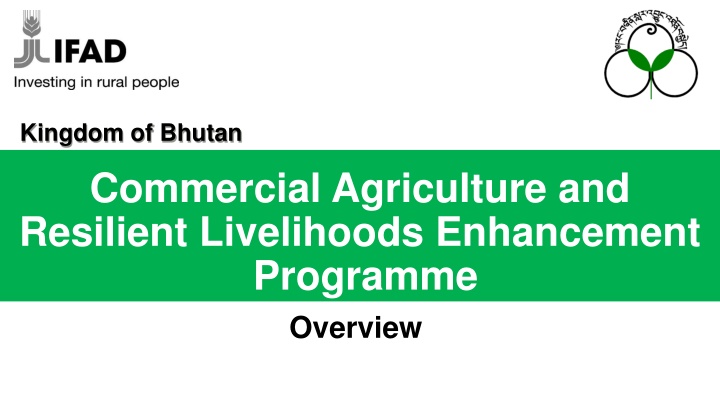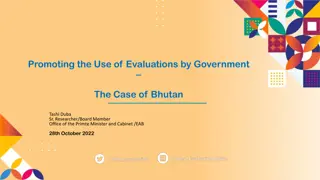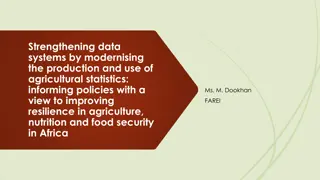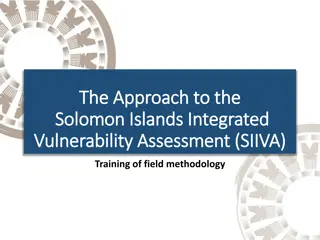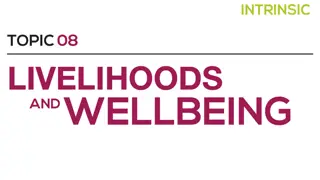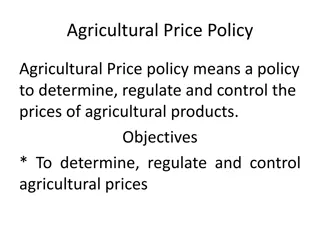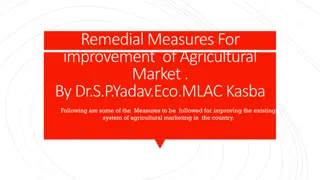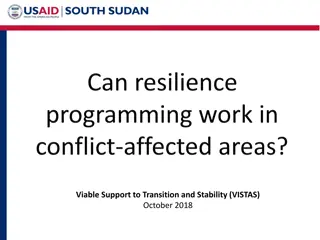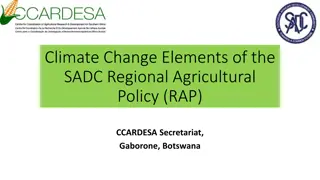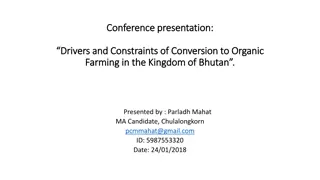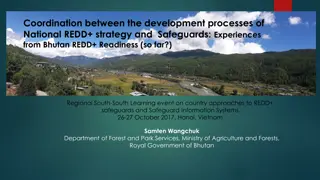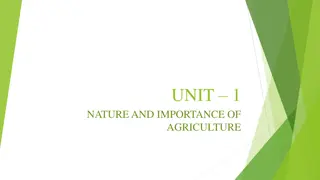Enhancing Agricultural Resilience and Livelihoods in Bhutan
The Kingdom of Bhutan Commercial Agriculture and Resilient Livelihoods Enhancement Programme (CARLEP) aims to increase smallholder farmers' incomes and reduce poverty through climate-resilient agricultural production. CARLEP builds on IFAD's longstanding partnership with the Royal Government of Bhutan, focusing on market-led agricultural production, value chain development, and institutional support. Key performance indicators include improving household asset index, reducing child malnutrition, and supporting smallholder households in climate change adaptation. The program targets nearly 29,000 households across Bhutan, emphasizing diverse integrated farming systems and resilience in rice production.
Download Presentation

Please find below an Image/Link to download the presentation.
The content on the website is provided AS IS for your information and personal use only. It may not be sold, licensed, or shared on other websites without obtaining consent from the author.If you encounter any issues during the download, it is possible that the publisher has removed the file from their server.
You are allowed to download the files provided on this website for personal or commercial use, subject to the condition that they are used lawfully. All files are the property of their respective owners.
The content on the website is provided AS IS for your information and personal use only. It may not be sold, licensed, or shared on other websites without obtaining consent from the author.
E N D
Presentation Transcript
Kingdom of Bhutan Commercial Agriculture and Resilient Livelihoods Enhancement Programme Overview
Project profile CARLEP is a follow-up project to MAGIP. Is a seven years project (2016-2022). It builds on prior and ongoing IFAD interventions. Goal: Sustainably increase smallholder producers incomes and reduce poverty through commercialization of production by programme households. Objective: Increased returns to smallholders farmers through climate-resilient production of crops and livestocks in nationally organized value chains and marketing systems.
IFAD in Bhutan CARLEP continues to build on IFAD s more than 35 years partnership with RGoB. CARLEP is the ninth Partnership from IFAD with RGoB and also the largest financing project. During the last 36 years IFAD has provided a total of US$ 52.9 million for investment in seven projects and programmes in Bhutan (as shown in next slide).
Loan amount (US$ mill) Grant amount (US$ mill) Project/Programme Duration Status Small Farmer Development & Irrigation Rehabilitation Project 1981-1989 6.9 0.6 completed Trashigang-Mongar Area Development Project 1987-1992 4.8 0 completed Punakha-Wangdue Valley Development Project 1989-1996 2.6 0 completed First Eastern Zone Agricultural Project 1992-1998 4 0 Completed Second Eastern Zone Agricultural Programme Agriculture Marketing & Enterprise Promotion Programme (AMEPP) 2000-2005 9.5 0 Completed 2006-2012 13.9 0.1 Completed Market Access & Growth Intensification Project 2011-2016 8.5 2 On-going Total 50.2 2.7
Key performance indicators: 5336 direct beneficiary HH report at least 25% improvement in HH asset index, 15% reduction in the prevalence of child malnutrition as compared to baseline 23 180 smallholder HH supported in coping with the effects of climate change Targeting: 28,975 HHs including indirect beneficiaries Value chains: 1. Diversity-Integrated farming system with fruits, cereals, pulses, oilseeds, tuber crops and fodder, backyard poultry and piggery production 2. Resilience-Rice production through enhanced water use efficiency and climate-resilient irrigation systems in 4 high potential southern Dzongkhags
Financing IFAD Loan 1 IFAD loan 2 IFAD Grant ASAP Grant Components RGOB FCBL Ben Total In % Market-led Agricultural production Value chain development and marketing Institutional Support and Policy Development Project management, Coordination and M&E 4.809 4.269 0.398 3.025 4.196 0.659 17.358 55 3.150 1.662 0.174 1.729 0.599 4.281 11.595 37 0.144 0.650 0.034 0.269 0.014 0.526 2 0.170 0.465 0.93 0.522 2.086 6 5.739 4.803 0.659 31.565 Total 8.273 5.997 1.073 5.023 *Amount in Million Dollar ($)
Programme components: COMPONENT 2: Value Chain Development and Marketing VC Development Business and marketing plans COMPONENT 1: Market-led Sustainable Agricultural Production Increased production Climate resilient agriculture COMPONENT 3: Institutional Support and Policy Development Market Information. Public Private Partnership. Policy lessons Components Outcomes Component 1Community-based Resilient Agricultural production has sustainably increased Component 2 Increased stallholder income from Crop and Livestock Value Chains Component 3Strengthened Agricultural Institutions and Policies Improved and Resilient Agricultural Marketing Practices
Major Activities under Each Component Component Major activities Sub-activities Upgrading of existing farmers' groups Climate smart Agriculture production and Management Training of Extension agents Production Support Funds Tools for Permaculture Nursery set up Water harvesting infrastructures Awarness and mobilization Trainings on livestock husbandry Training of CAHWs Innovation through Permaculture and Biogas 1. Market-led Sustainable Agricultural Production Dairy production strengthened and expanded CAHW Modal Kits for AI Practitioners Prenennial feed production in marginal and fallow land Use of residuals for animal's feeds Feed and Fodder production
Major Activities under Each Component Component Major activities Sub-activities Establishment of farmer's shops Establishment of Marketing Infrastructures Farmers Groups and Cooperative development Strengthen the marketing Information systems Strengthening marketing institutions Strengthening farmers groups/marketing groups 2.Value Chains development and Marketing Strengthening of FCBL's, DAMC's capacities in value chain development 3. Institutional Support and Policy Development Capacity Development
Programme implementation approach: Will follow an inclusive approach, ensuring all the HHs residing in the selected area will form the target group. Preference/special emphasis will be given to the inclusion of women, youth and poorer households. Will adopt a flexible, non-perspective, process-oriented approach to enable the primary stakeholders to determine the scope of programme activities. Will also involve the testing od innovations like e-agriculture using ICT and promotion of permaculture. Note: The guidelines for the provision of SIF and PSF is available with PMO
National Programme Steering Committee (NPSC) Office of the Programme Management, Wengkhar Regional Programme Implementation Committee (RPIC) Liaison office (PPD & AFD) Thimphu Dept. of Local Government Dept. of Agriculture Dept. of Livestock DAMC FCBL DPA ARDC RLDC Dzongkhags DNB RAMCO NPPC Input Supply Farms Gewogs NSC Chiwogs NPHC AMC
Unique strategies of CARLEP Prioritization for the most vulnerable poor and smallholder households, particularly women and youth Inclusion of the poorest and most vulnerable households in community institutions such as farmers groups and cooperatives Inclusive approach to include all households living in a particular community in the programme. Consideration of gender issues and mainstreaming it in programme management. CARLEP s approach is aligned with RGoB s 11th FYP. Environment protection and conservation issues have been incorporated in production modals through value chains. CARLEP evolved from the experiences and achievements of MAGIP and prior Projects and Programmes.
Risk Foreseen Limited present FCBL capacity to develop value chains, enterprises and public private partnerships. Difficulty in harmonizing divergent individual-community. Limited extension service outreach. Low agriculture research uptake. Poor adaptability of crops and technology introduced.
16 14.27 14 Amount in Million Dollar 12 10 8 5.02265.7385 4.8024 6 4 1.0726 0.6588 2 0 IFAD Grant IFAD Loan ASAP Funding Source RGoB FCBL Beneficiaries
Key Implementing Agencies Research and Development Center, Wengkhar Regional Livestock Development Center, Khangma Food Corporation of Bhutan Limited Regional Agricultural Marketing and Cooperatives Samdrup Jonkhar Initiative Contact No. 04 641449/ F-641102 04 535112/535115 04 641322/F-641252 Agriculture Livestock Agriculture Livestock Agriculture Livestock Agriculture Livestock Agriculture Livestock Agriculture Livestock 04 545127 Lhuentse 04 545105 04 641181 Mongar 04 Dzongkhags Samdrup Jonkhar 07 251125 04 521296/521252 Trashigang 04 521602/521468 04 781104 Trashi Yangtse 04 781111 07 471137 PemaGatshel 07 471157
Staffs Designation Programme Director Accounts Officer Contact No. e-Mail ID tashwua@gmail.com ktenzin@haa.gov.bt Mr. Tashi Wangdi Mr. Kinley Tenzin 17684221 17643790 M&E and Gender Officer Mr. Karma Tenzin 17645356 ktenzin2005@gmail.com Mr. Norbu CM, Livestock 17922538 n.norbu@yahoo.com Mr. Ugyen Wangdi CM, Agriculture 17546756 uwangbidung@gmail.com Project Support Off. Mr. Sangay Choda 17858497 sanrigs858@gmail.com Ms. Karma Wangmo KM Officer 17517091 karwangz@yahoo.com CM, Marketing and Value Chain Mr. Sangay Choeda 17968694 ichoeda@gmail.com Ms. Choki Wangmo Adm. Assistant 17623710
